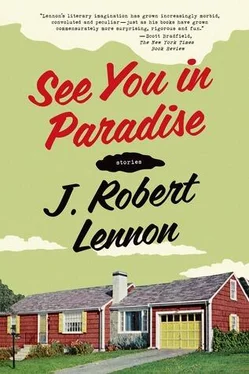This was a pleasure. I love to drive. When it’s early, as it was that day, the road is endlessly interesting, a gift that renews itself mile upon mile, and the few other drivers you pass are all your greatest friends. The road signs, the flashing lights are there for you alone, the state cops in their cruisers your personal protectors. The stars were winking out on my left, the sun rising on my right, and the van clung to every hill and dale as though it were driving itself. From time to time I cracked a window to let the air replenish itself; the girls seemed not to notice, though Margaret stirred, scowled, moved her stiff mouth as though dreaming of an uncooperative employee.
Everyone was awake by six, when we were about to leave the Thruway for our traditional stop at Mister Bip’s. The girls were subdued and expressionless, their hair stuck to their faces; Margaret was staring out the window. I signaled and pulled off at the exit.
Rae, newly weight-conscious, had only toast and black coffee. Lyn ordered oatmeal, her breakfast every single morning since she got on solid food back in ’96. Margaret chose the Greek omelet, and it sounded so good to me I asked for the same. She glanced at me as though wary of being mocked. I offered a thumbs-up, which she rebuffed with a blink.
“I wonder if this is all from the same part of the field,” Lyn said ten minutes later, the first words any of us had spoken to the others in hours.
“What?” Margaret asked.
“Like where it was harvested.” She held up a spoonful of the oatmeal. “If I was out there in the field, like, I could see all of my breakfast around me.”
“Maybe,” I said.
“Do you really need that much brown sugar?” Margaret wanted to know.
“I love brown sugar!”
“You are going to be so zit-infested someday,” Rae offered.
“I think it’s all from the same corner of the field,” Lyn said, her tone indicating that the debate was over. “I think all these oats are friends.” She switched to a tiny oat-voice. “Heeey, buddy! Wassup?”
I guffawed. Rae said God. Margaret looked at her watch.
An hour later, with Bob Dylan yammering about somebody’s new hat, Rae said, “Damn, I’m hungry, Dave.”
“You shouldn’t have had just toast and coffee,” I said.
“I know.” She sighed. “Damn.”
“That’s enough damns,” Margaret said wearily.
“Your mother’s right.”
I could hear Rae’s lips smack. “Sorry, Mags,” she said.
Margaret opened her mouth, then closed it without speaking.
“I saw you making love with him,” Bob Dylan said. “You forgot to close the garage door.”

A new alertness overcame us as we crested the mountain pass; everyone sat straight in their seats, on the lookout for minor changes in the landscape. The next fifteen minutes would set the tone for the days to come: was the bait and tackle stand still open? Was the Adirondack Backpacker’s Gazette still in print? Would the water-stained map still be safely bolted behind cracked plexiglas in front of the defunct post office, as always? Yes, yes, and yes. Tentative good cheer reigned as we bumped and shuddered our way down the gravel road to the water. I glanced over at Margaret and saw the corners of her mouth twitching, as though in pleasure. The final test of our journey’s success, however, still lay ahead: the Grimy Fisherman’s Bass Shack, our favorite restaurant anywhere in the world. Its owner, Belinda, had become a good friend over the past decade; and though we wondered how many other “good friends” she had, among the many vacationers who wished, as we did, to feel like locals for one week a year, we nevertheless were certain her friendship with us was something special. Furthermore, the food at her Shack was fantastic, and Margaret had stolen, with Belinda’s permission, many a fine dish from its modest menu.
It was to Margaret that Belinda’s place was most important, and it was her sharp eye that noticed it first, set back in the pines at a bend in the road. “Thank God,” she said, and I honked the horn as we passed. The place looked pretty empty, though — it didn’t open until eleven.
Our cabin was not far beyond. We pulled into the gravel drive and leaped out with a collective cheer, the girls hugging one another the way they used to all the time when Rae was seven and Lyn was five. Margaret inhaled deeply. “Seems the same,” she said.
“It’ll be like always,” I assured her.
To this, she had no response.
The key was under the stump behind the trash hutch, as usual, though it was a new stump: I had noticed the old one going rotten last year. We crowded around the door as I unlocked it, and tumbled in like a pack of stray cats.
The cabin was of rough-hewn, unpainted logs, and consisted of one large common room and two bedrooms, each containing a bunk bed. The four of us fanned out, sniffing around our favorite objects and areas, making sure they were as we left them. Dozens of visitors occupied this place every year, but we always got the impression, upon returning, that it had been empty since our last visit. There were always small differences — certain decades-old magazines missing, sheets that bore the scent of a new detergent, a favored dishrag retired from service — but rarely any of substance. One year there was a new refrigerator, which we all stared at in shock for some seconds. Another year, a woodstove appeared in the corner, presumably in order to draw late-season customers.
But this year, nothing much. The lightbulbs had been replaced by energy-saving compact fluorescents, and the bathroom was filled with new towels and washcloths — overall, though, our cabin was the same. GUESTS PLEASE PROVIDE BALANCE OF RENT AND DEPOSIT AT OFFICE THANKS, read the familiar manila envelope, twice-laminated with packing tape, that was affixed to the fridge by a (surprisingly powerful) Mount Rushmore magnet. The sight of it loosened something in my chest, and I went off to the kitchen window to gather myself.
When I came to, the girls had run down to the lake in their swim-suits, and Margaret was out on the path, taking her annual Inaugural Stroll. I went to the bedroom. Her backpack, suitcase, and straw hat lay on the lower bunk, staking their claim. My own suitcase had been heaved onto the top, along with my plastic grocery sack of rock and roll biographies. She was a small woman, Margaret, and it had probably taken a lot of effort to get that stuff up there. I climbed the wooden ladder and lay facedown beside it.

Margaret was the owner and head chef of Chez Maggie, a popular bistro in Nestor, the college town where we lived. She was extremely popular there, and was featured in the restaurant’s print and TV ads, flashing her trademark wink and “waggling OK” hand gesture. She wrote the “Feedbag” column for the local paper, a kind of half-recipes, half-entertaining-philosophy thing, which she was in the process of trying to get into syndication. Indeed, after nine years of running Chez Maggie, Margaret had acquired ambitions. She was prone to making snarky comments about Nestor and its smug hippie attitude, and had been doing a lot of research on up-and-coming American cities (Portland, Denver, Salt Lake) for reasons she declined to provide. She attempted to enthuse me about these places but never explained why I ought to be enthused, and seemed annoyed and unsurprised when I failed to follow her lead.
I say this to establish that I did know that something was coming: some theatrical reveal of the whole plan; some kind of prim, professional report that I would receive one night, over wine and an elaborately simple knockout dessert. And so I can say with confidence that I was not entirely surprised by the moment when it came. But there was no wine, and there was no dessert, and the girls weren’t just in bed, they were in bed forty miles away at Margaret’s mother’s place, where she had dispatched them under the pretense that we would get to have an “intimate” “time alone,” which I thought meant wild nude abandon, but which actually meant something else.
Читать дальше













